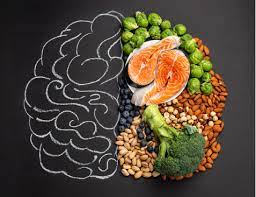Introduction
Mental health is influenced by various factors such as genetics, environment, lifestyle, and physical health. However, an often-overlooked contributor is nutrition. Just as a balanced diet supports physical well-being, it also plays a crucial role in maintaining mental wellness. The brain, like any other organ, needs essential nutrients to function properly. From regulating mood to reducing the risk of depression and anxiety, nutrition has a direct impact on mental health.
How Nutrition Impacts the Brain and Mental Health
The Brain-Gut Connection
The gut and brain are linked through the gut-brain axis, meaning the food we eat influences brain function. A healthy gut microbiome improves the production of neurotransmitters like serotonin and dopamine, which are key to mood regulation.
Nutrient Deficiencies and Mental Health
- Vitamin D deficiency is linked with seasonal affective disorder (SAD) and depression.
- Vitamin B12 and folate deficiencies can lead to fatigue, irritability, and cognitive decline.
- Omega-3 fatty acid deficiency is associated with higher risks of anxiety and depression.
Key Nutrients That Support Mental Health
1. Omega-3 Fatty Acids
- Found in fatty fish, walnuts, chia seeds, and flaxseeds.
- Improve brain cell communication and reduce inflammation linked to depression.
2. Vitamins B6, B12, and Folate
- Found in leafy greens, legumes, eggs, and whole grains.
- Essential for producing neurotransmitters like serotonin and dopamine.
3. Vitamin D
- Obtained from sunlight, fortified foods, and fatty fish.
- Plays a role in mood regulation and lowering depression risk.
4. Magnesium and Zinc
- Found in nuts, seeds, dark chocolate, and whole grains.
- Help reduce anxiety and improve brain function.
5. Antioxidants
- Found in berries, green tea, and colorful vegetables.
- Protect the brain from oxidative stress, which is linked to mental decline.
Foods That Promote Mental Wellness
Whole Foods and Balanced Meals
- Whole grains, lean proteins, fruits, and vegetables provide steady energy and stabilize mood.
Fermented Foods
- Yogurt, kefir, kimchi, and sauerkraut improve gut health, positively impacting mental well-being.
Dark Chocolate
- Contains flavonoids and magnesium, which help reduce stress and improve mood.
Herbal Teas
- Chamomile and green tea promote relaxation and reduce anxiety.
Foods That Negatively Affect Mental Health
- Processed foods high in sugar and trans fats can cause mood swings and inflammation.
- Caffeine overload may lead to anxiety and disrupted sleep.
- Alcohol negatively impacts brain chemistry and increases the risk of depression.
Practical Tips for Using Nutrition to Support Mental Health
- Eat regular, balanced meals to stabilize blood sugar.
- Include a variety of colorful fruits and vegetables daily.
- Stay hydrated to maintain concentration and mood balance.
- Limit processed foods and sugary snacks.
- Consider professional advice for supplements if deficiencies are detected.
Conclusion
The connection between nutrition and mental health is undeniable. A balanced diet rich in essential vitamins, minerals, and healthy fats not only supports physical health but also strengthens mental well-being. By prioritizing whole foods, limiting processed items, and maintaining a healthy gut, individuals can significantly reduce the risk of depression, anxiety, and cognitive decline. Nutrition may not replace therapy or medication, but it is a powerful ally in promoting overall mental wellness.
FAQs
Q1. Can diet alone cure mental health disorders?
No, diet is not a cure but can complement treatments like therapy and medication to improve outcomes.
Q2. How quickly can nutrition changes affect mental health?
Some people notice improvements in mood and energy within weeks, but long-term consistency is key.
Q3. Is caffeine bad for mental health?
In moderation, caffeine can boost alertness, but excessive intake may trigger anxiety and poor sleep.
Q4. What diet is best for mental health?
The Mediterranean diet, rich in whole grains, fish, fruits, and vegetables, is widely linked to better mental wellness.
Q5. Should I take supplements for mental health support?
Supplements can help if you have deficiencies, but a balanced diet is the best first step. Consult a healthcare professional before starting supplements.

